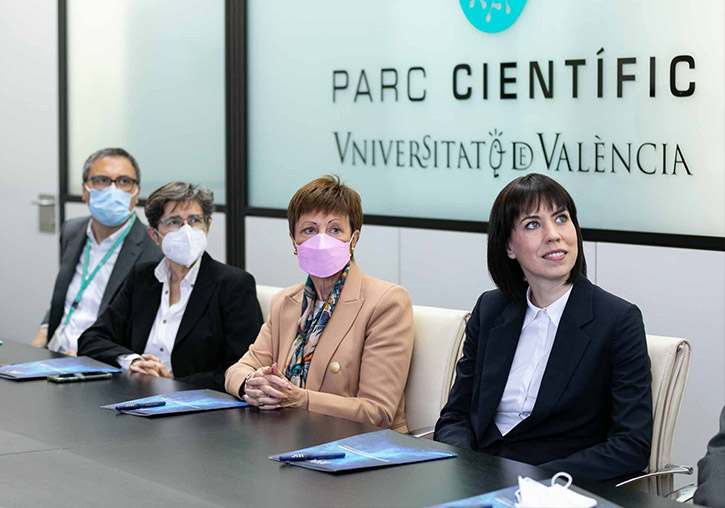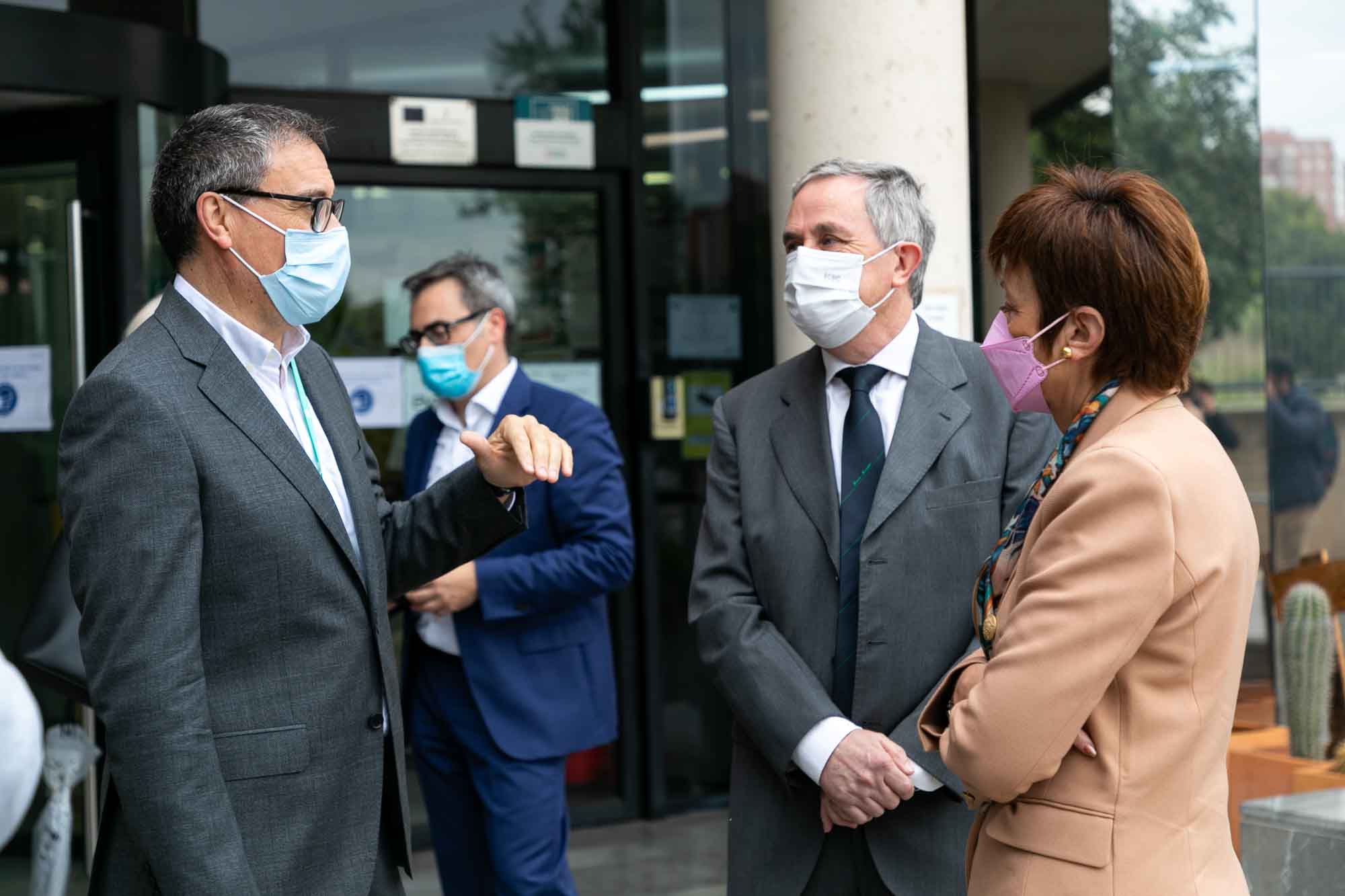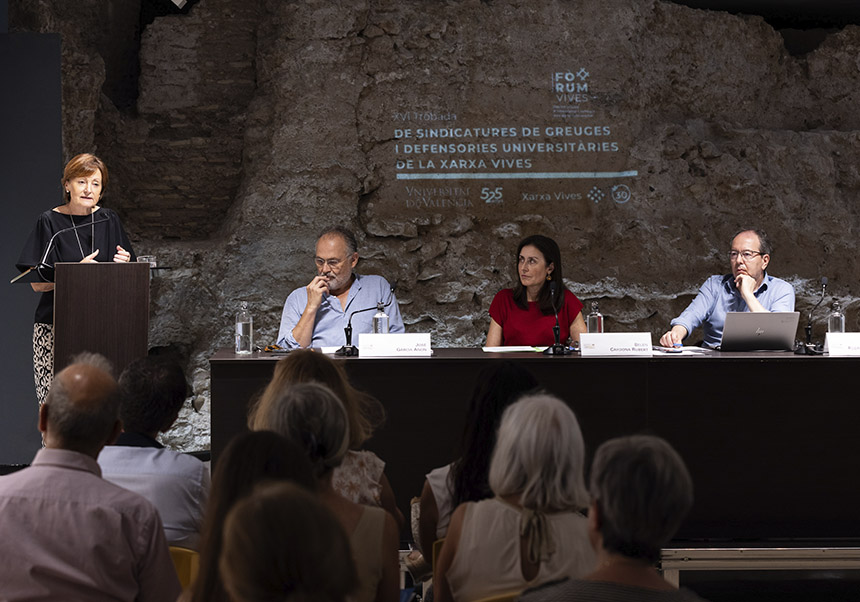The minister of Innovation and Science visits the R&D and hadrontherapy projects of the Institute of Corpuscular Physics
- Office of the Principal
- May 6th, 2022

Diana Morant, minister of Innovaton and Science, has visited the facilities of the Institute of Corpuscular Physics (IFIC), a joint centre of the Universitat de València; and the Spanish Research Council (CSIC), an internationally prestigious institute in the field of nuclear physics and particles that is located at the Science Park of the academic institution.
During her visit, the minister has met the management team of the IFIC (which is comprised of Nuria Rius and the three Deputy Directors, Berta Rubio, Michel Sorel and José Enrique García); María Vicenta Mestra, the principal of the Universitat de València; Rosa Donat, the vice-principal of Innovation and Transfer of the UV; Juan José Borrás, the director of the Science Park; and Juan Fuster, the Institutional Delegate of the CSIC in the Valencian Community. Among the participants were also Gabriela Llosá, researcher at the IFIC and especialist in the medical field; Pilar Hernández, researcher at the IFIC and manager of the National plan; and Concepción Oliver, researcher at the CIEMAT.
Diana Morant had the opportunity to visit some of the laboratories of the research centre, one of them being the ERC Consolidator HYMNS project. This is a project of technical development for the construction of a Carbon 6+ injector for hadrontherapy: INITIAL-LINAC6+ and the VALID project. These projects are focused on the improvement of the hadrontherapy technology against cancer, which is one of the greatest challenges in our current society.
HYMNS-ERC
The HYMNS-ERC group, leaded by César Domingo, is working on the development of a technology that can recreate and measure in the laboratory the nuclear reactions that occur within stars, which are the same reactions that generate the chemical elements in the universe. Recently, these technological developments have been adapted and applied to the field of hadronthrapy for the first time. This type of therapy for treating cancerous tumors uses proton beams in a more efficient and less invasive way if compared to conventional radiotherapy treatments.
INITIAL-LINAC6+
Juan Fuster, who apart from being the CSIC delegate in the Valencian Community is also a researcher at the IFIC, has presented the INITIAL-LINAC6+ project together with Concepción Oliver from the CIEMAT. The aim of this project is to achieve the technological development for the construction of a Carbon 6+ injector for hadrontherapy.
This new technology represents the future generation of particle accelerators for clinical use, particularly of carbonate ions, which optimises radiotherapy dosage in cancer patients. This progress also results in improvements regarding the use of conventional therapy, including therapy with X-rays, but also with protons, due to a higher radiobiological efficiency. Moreover, it also allows for a better distribution of a targeted dosage on the affected tissue, which subsequently allows for a higher effectiveness in its usage and less damage in healthy areas.
VALID
The IRIS group, coordinated by the researcher Grabiela Llosá Llácer, has developed a specific system for the monitoring of hadrontherapy through a gamma-rays detector similar to a Compton camera system. The system is designed for controlling treatments with this type of therapy, which is applied whenever it is advantageous over conventional techniques. For instance, it could be applied in tumors located near high-risk organs and that require a high dosage of radiation for its control, since they receive less radiation this way. It can also be applied in pediatric tumors, considering the sensibility of the developing organs.
Following successful initial results, a clinically feasible prototype is being developed and validated in near real-world conditions. The VALID project, funded by the Ministry of Science and Innovation, will allow tests to be carried out at the Quironsalud protontherapy centre in Madrid and to evaluate its use in other areas of medical imaging. The aim is to awaken interest in technology in companies to succeed in its transfer and commercialisation.
Compton cameras are currently presented as a promising alternative for this usage in the field of the development of hadrontherapy monitoring techniques. This is achieved thanks to the ability of image collection and of image quality, since they have a compact design and are easier to integrate in treatment rooms than other technologies are.

















